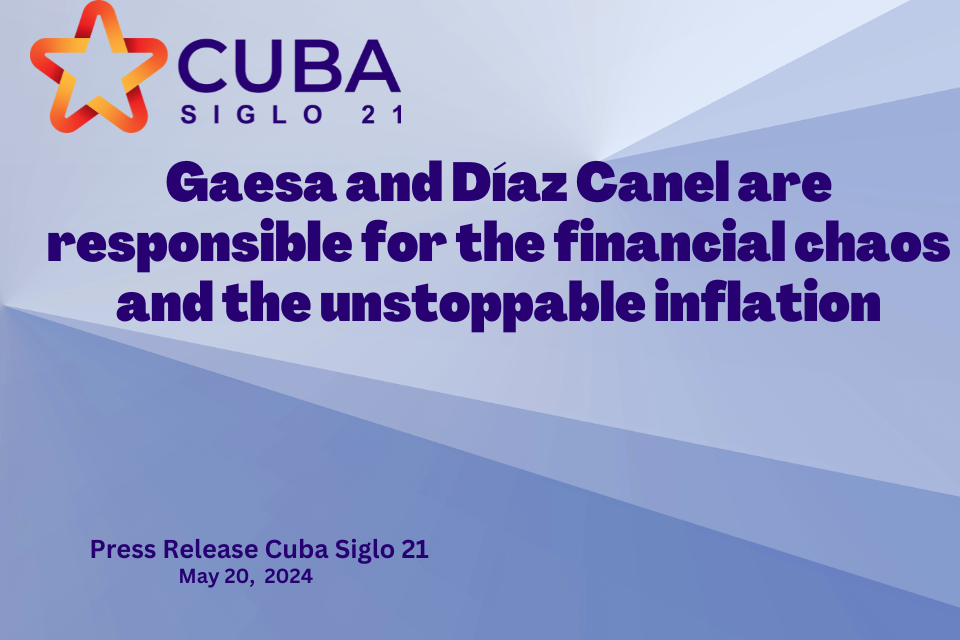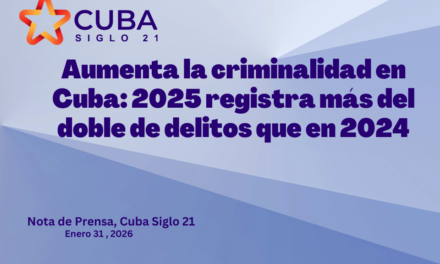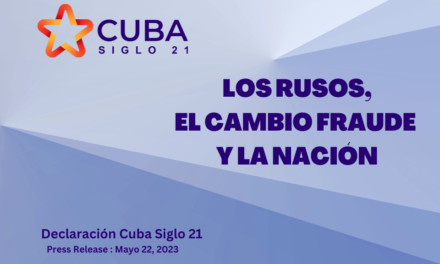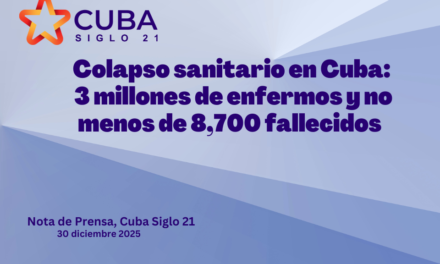Descargar Dossier completo en pdf
Download complete Report in pdf
See Summary
May 20, 2024- The launching of the Dossier Cuba 21 No.22 “GAESA and Díaz Canel: the most responsible for inflation in Cuba” by economist Emilio Morales attributes the causes of inflation to corrupt maneuvers by GAESA (Grupo de Administración Empresarial S.A.), a corporation linked to the Castro clan and their cronies, to appropriate foreign currency inflows, and to the ineffective and submissive management of President Miguel Díaz Canel. The root causes of this unstoppable inflation are the corrupt control that GAESA -a corporation above all audits- has had over the country’s finances for the last 8 years through the International Financial Bank (IFB), the government’s subservience to GAESA and the lack of intention for a restructuring of the economic model that has more than demonstrated its inefficiency.
Since Miguel Díaz Canel assumed the presidency on October 10, 2019, the dollar has gone from trading at 1 x 24 CUPs to 1 x 395 CUPs, an increase of 1,537.5%. This figure is a clear indication of the failure of his administration. The Monetary Ordering Task, implemented to eliminate the dual currency, has resulted in an increase in the number of currencies in circulation, further complicating the financial system. Currently, there are three exchange rates for the CUP: an informal variable rate (395 CUP per USD) and two official constant rates (24 CUP and 120 CUP per USD). This diversity distorts the market, hinders business activity, and negatively affects salaries and pensions, leading to the bankruptcy of companies, shortages of products and an increase in the cost of living. The author includes a revealing chronological table of inflation growth since the arrival of Díaz Canel.
On the other hand, GAESA, after appropriating the Banco Financiero Internacional (BFI), has dominated through it the country’s finances for the last eight years without being accountable for any independent audit. In 2016, in an obscure operation, the Central Bank of Cuba ceded the BFI to GAESA. Today the BFI controls 95% of the national finances. This left the institutionalized bureaucratic government practically without financial resources by forcing it to deposit its foreign exchange in the BFI, turning it into a kind of governance subordinated to this new supra power.
GAESA’s control over the finances and the economy, its continuous appropriation of the most profitable lines of the economy has prevented the implementation of a coherent economic program that could lead the country out of its current multi-systemic crisis.
At the beginning of May, the dollar reached 395 CUP. This devaluation has reduced the minimum wage from 2,100 CUP per month to an equivalent of only 5.31 USD, plunging the population into an unprecedented level of extreme poverty on the island.
The government’s economic policies, characterized by improvisation and ideological entrenchment, have resulted in a breakdown of the financial system. The most controversial measures include the creation of the Free Convertible Currency (FCM) stores, the Monetary Ordering Task, the prohibition of physical dollar deposits and the implementation of a new foreign exchange market, all of which have contributed to an uncontrollable inflationary spiral.
The mismanagement of investments, aimed at satisfying the interests of GAESA’s oligarchs, has left the state without resources, crumbling emblematic industries such as food, energy, transportation, health, sugar, and education. The absence of an investment policy that responds to the strategic needs of the country and not to the corporate profit-oriented interests of GAESA has exacerbated the situation.
As if that were not enough, Cuba’s foreign debt grew again at an accelerated pace after it had been largely forgiven and its payments restructured in the shadow of Obama’s thaw. It is now estimated at 46 billion dollars. That scares off investors and thus stifles the economy. Cuba has defaulted on its payment commitments, ceasing to be a reliable economic partner even for its political allies such as China and Russia. In addition, the Cuban financial system has practically run out of cash, creating difficulties in the collection of salaries and pensions in banks for workers and retirees.
The author believes that to eliminate all this financial chaos, it is essential to bring order to the government itself. First, the Central Bank of Cuba (BCC) should resume the role that corresponds to it and that it ceded to the BFI of GAESA. The author believes that, to address this crisis, it is imperative that the Central Bank of Cuba follow international standards, recognize the informal exchange rate, and unify the exchange rate system. It must also drastically reduce public spending represented by the gigantic bureaucratic state machinery and stop the uncontrolled issuance of cash. The Central Bank must be able to control the BFI – not the other way around – and GAESA must be placed under the supervision and control of the Cuban state. The subordination of the interests of that corporation to the strategic needs of the country is essential to recover the country’s finances.
The government must control the operations of the BFI and GAESA to recover its capacity to redirect investments to strategic sectors. At the same time, it must remove all the obstacles that currently impede the functioning of a market economy to free all the productive forces of the nation. The transformation of the economic model is an essential condition to be able to guarantee the supply of vital products and services and improve the living conditions of the population.
This humanitarian crisis has generated a massive exodus, with more than 723,000 Cubans fleeing hunger and misery in recent years. The totalitarian state has led the country to economic and social collapse, and only a change of system, putting an end to the power of the GAESA oligarchs and the Communist Party, today subjugated to them, can offer a viable solution. The implementation of basic political, civil, economic, and social liberties is the first step towards Cuba’s recovery and progress.







